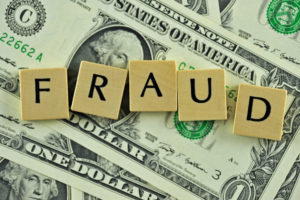SCAMS AND THE ELDERLY – PART 4
In the first three parts of this series we’ve learned who is targeted and why they’re targeted. We’ve also talked about the some of the more common kinds of scams against the elderly. So what’s next?
WARNING SIGNS OF ELDER FRAUD (And some of these indications aren’t just for seniors.)
You might see stacks of unsolicited mail saying the recipient is a “guaranteed winner.”
Or, you might notice an unusual number of packages containing inexpensive costume jewelry, plastic cameras, watches etc.
The senior might have excessive numbers of magazine subscriptions, or receive unsolicited phone calls from operators offering “fantastic opportunities” to claim prizes or invest.
Meanwhile the elderly person might have trouble covering basic expenses such as food and utilities, when their income should support those needs.
At the bank, the senior is accompanied by a stranger who encourages a large withdrawal. Or there a checks written and withdrawals for individuals, marketing companies, or other businesses that the elder cannot explain.
INDICATORS OF FINANCIAL ABUSE
A recent acquaintance expresses an interest in finances, promises to provide care, or ingratiates him or herself with the elder.
A relative or caregiver has no visible means of support and is overly interested in the elder’s financial affairs.
A relative or caregiver expresses concern over the cost of caring for the elder, or is reluctant to spend money for needed medical treatment.
Bills are not being paid.
The elder is isolated by a relative or caregiver who makes excuses when friends or family call or visit, and does not give the elder messages.
A relative or caregiver gives implausible explanations about finances, and the elder is unaware of or unable to explain the arrangements made.
Financial statements are sent to the relative or caregiver and are not accessible to the senior.
At the bank, the elder is accompanied by a relative or caregiver who refuses to let the elder speak for themself, and/or the elder appears nervous or afraid of the person accompanying him.
The elder is concerned or confused about “missing money.”
There are suspicious signatures on the elder’s checks, or the elder signs checks and another party fills in the payee and amount sections.
There is an unusual amount of banking activity, particularly just after join accounts are set up, or someone new starts helping the senior with their finances.
A will, power of attorney or other legal document is drafted, but the elder does not understand its implications.
WHAT TO DO – PREVENTATIVE
Be involved in your family member’s life. This is SO important.
My mother complained to me that she had ordered a magazine and she kept getting bills for them—even though she knew she’d paid. I took a look, and saw that the magazine was targeted toward’s seniors. There were two different magazines with almost identical names, (confusing to a senior) and there was a document on the packaging that stated: Don’t miss out, special savings, renew now for only $10.00—Don’t miss a single issue. When I called the publisher of the magazines, I discovered that my mother had paid for the two magazines subscriptions for the next six years! She was 87 at the time. The publisher refused to refund any of the money, and my mother passed away before her subscriptions ran out.
Was this elder fraud? Not by the legal definition, but it was morally wrong…and it’s my opinion the publisher knew exactly what they were doing.
In another instance, my brother (who’d had a stroke and was partially paralyzed) came across a woman he’d dated years before his stroke. Suddenly, she was driving him to the store, and over to her house to listen to music. Due to his stroke, and diminished mental capacity, I was handling his finances. I wasn’t overly concerned with his new “friend” until he mentioned he was giving her gas money. Then I checked his bank account and saw that she’d written herself a check for $200.00, which he’d signed. Since they’d only been hanging out together for about a week, I knew there was no way she’d driven him far enough to justify a $200.00 check. I confronted her, and convinced her she should give the money back.
Try to get an understanding of your senior’s finances and how they’re handled. Know where things are kept and how many accounts and numbers.
Is there life insurance? If so, where are the policies?
If your loved one is in a care facility, show up at unexpected times and unannounced. Show up often and know the staff. Be interested and invested. Your loved one benefits because the staff knows YOU care.
WHAT TO DO – AFTER A CRIME
Notify the bank. The bank employees are often in a good position to note suspicious activity, such as a sudden withdrawal of large sums of money or use of an ATM card by an elder who is housebound.
Contact Adult Protective Services (APS) – a government-affiliated agency charged with investigating reports of elder financial abuse and offering assistance to victims.
Alert law enforcement. The police or local prosecutor’s office will often intervene when there is good evidence that a crime is being committed.
So, that wraps up this series about SCAMS AND FRAUD – THE ELDERLY.
I hope you’ve enjoyed the series and learned something.
Until next time,
Remain vigilant
KMA 367
WARNING SIGNS OF ELDER FRAUD (And some of these indications aren’t just for seniors.)
You might see stacks of unsolicited mail saying the recipient is a “guaranteed winner.”
Or, you might notice an unusual number of packages containing inexpensive costume jewelry, plastic cameras, watches etc.
The senior might have excessive numbers of magazine subscriptions, or receive unsolicited phone calls from operators offering “fantastic opportunities” to claim prizes or invest.
Meanwhile the elderly person might have trouble covering basic expenses such as food and utilities, when their income should support those needs.
At the bank, the senior is accompanied by a stranger who encourages a large withdrawal. Or there a checks written and withdrawals for individuals, marketing companies, or other businesses that the elder cannot explain.
INDICATORS OF FINANCIAL ABUSE

A recent acquaintance expresses an interest in finances, promises to provide care, or ingratiates him or herself with the elder.
A relative or caregiver has no visible means of support and is overly interested in the elder’s financial affairs.
A relative or caregiver expresses concern over the cost of caring for the elder, or is reluctant to spend money for needed medical treatment.
Bills are not being paid.
The elder is isolated by a relative or caregiver who makes excuses when friends or family call or visit, and does not give the elder messages.
A relative or caregiver gives implausible explanations about finances, and the elder is unaware of or unable to explain the arrangements made.
Financial statements are sent to the relative or caregiver and are not accessible to the senior.
At the bank, the elder is accompanied by a relative or caregiver who refuses to let the elder speak for themself, and/or the elder appears nervous or afraid of the person accompanying him.
The elder is concerned or confused about “missing money.”
There are suspicious signatures on the elder’s checks, or the elder signs checks and another party fills in the payee and amount sections.
There is an unusual amount of banking activity, particularly just after join accounts are set up, or someone new starts helping the senior with their finances.
A will, power of attorney or other legal document is drafted, but the elder does not understand its implications.
WHAT TO DO – PREVENTATIVE
Be involved in your family member’s life. This is SO important.
My mother complained to me that she had ordered a magazine and she kept getting bills for them—even though she knew she’d paid. I took a look, and saw that the magazine was targeted toward’s seniors. There were two different magazines with almost identical names, (confusing to a senior) and there was a document on the packaging that stated: Don’t miss out, special savings, renew now for only $10.00—Don’t miss a single issue. When I called the publisher of the magazines, I discovered that my mother had paid for the two magazines subscriptions for the next six years! She was 87 at the time. The publisher refused to refund any of the money, and my mother passed away before her subscriptions ran out.
Was this elder fraud? Not by the legal definition, but it was morally wrong…and it’s my opinion the publisher knew exactly what they were doing.

In another instance, my brother (who’d had a stroke and was partially paralyzed) came across a woman he’d dated years before his stroke. Suddenly, she was driving him to the store, and over to her house to listen to music. Due to his stroke, and diminished mental capacity, I was handling his finances. I wasn’t overly concerned with his new “friend” until he mentioned he was giving her gas money. Then I checked his bank account and saw that she’d written herself a check for $200.00, which he’d signed. Since they’d only been hanging out together for about a week, I knew there was no way she’d driven him far enough to justify a $200.00 check. I confronted her, and convinced her she should give the money back.
Try to get an understanding of your senior’s finances and how they’re handled. Know where things are kept and how many accounts and numbers.
Is there life insurance? If so, where are the policies?
If your loved one is in a care facility, show up at unexpected times and unannounced. Show up often and know the staff. Be interested and invested. Your loved one benefits because the staff knows YOU care.
WHAT TO DO – AFTER A CRIME
Notify the bank. The bank employees are often in a good position to note suspicious activity, such as a sudden withdrawal of large sums of money or use of an ATM card by an elder who is housebound.
Contact Adult Protective Services (APS) – a government-affiliated agency charged with investigating reports of elder financial abuse and offering assistance to victims.
Alert law enforcement. The police or local prosecutor’s office will often intervene when there is good evidence that a crime is being committed.
So, that wraps up this series about SCAMS AND FRAUD – THE ELDERLY.
I hope you’ve enjoyed the series and learned something.
Until next time,
Remain vigilant
KMA 367
Published on June 24, 2019 14:50
No comments have been added yet.



